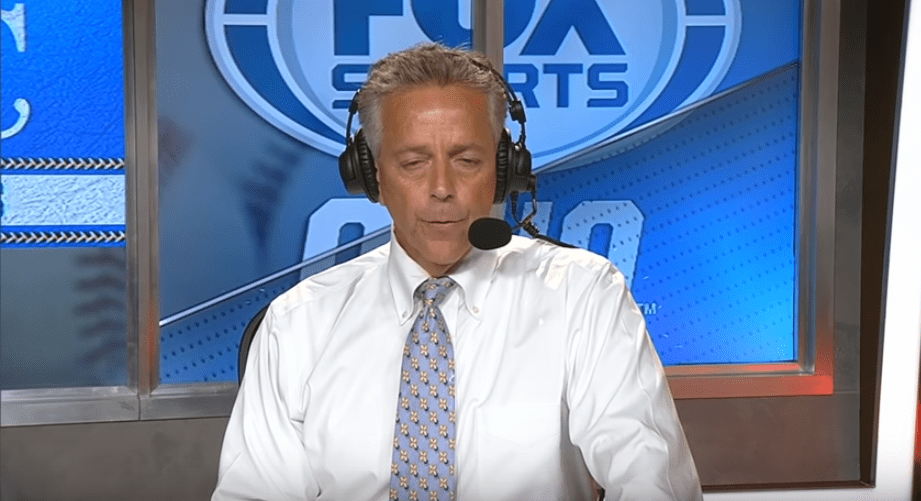If Thom Brennaman's strategy to get back in society's good graces was to be interviewed by someone who would make him look great by comparison, well, that wasn't the worst idea. The former Cincinnati Reds and NFL broadcaster, who hasn't been on national TV since he said a homophobic slur live on the air about 14 months ago, spoke with former play-by-play announcer David J. Halberstam for a Q&A published Wednesday on his site Sports Broadcast Journal. Somehow the interviewer came off looking worse than the disgraced subject.
Halberstam, who in his career has done PBP for the Miami Heat and St. John's basketball, starts off the interview with a rant about how unfairly Brennaman has been treated in these "14 months of hell":
The inconsistencies of punishment are inexcusable. On the one hand, ESPN’s cavalier, Adrian (Woj) Wojnarowski elbowed his way onto center stage, with no concern for others, and has the audacity to tell a sitting senator through social media, f…you. Gutless ESPN management then responds by giving him a little tap on the wrist, instead of telling him to get his backside out of the building and not to return for six months.
Meanwhile, Brennaman was blackballed instantly and his life turned upside down in a matter of a few seconds. Face it, he was given an unwritten life sentence. No appeals and no parole. The umpires in the clouds issued their verdict and tiptoed back under their black robes. They’ll never be identified.
Thom’s career was destroyed with impunity and through a typical rush to judgment. Imagine. A death sentence for a first-time verbal offender!
This is nine paragraphs into the article, and we're still not at the interview yet, but there's a lot to correct here. The spat between Wojnarowski and Josh Hawley didn't happen through social media; Woj replied to the senator's email with "Fuck you," and Hawley chose to whine about it on Twitter. Thom Brennaman didn't say "one of the fag capitals of the world" under duress; he chose to say it during his job and clearly would not have thought twice about it had it been off the air. "The umpires in the clouds" were identified; they were Brennaman's bosses, who chose to fire him from his two jobs. No ominous, unknown force made any of these choices. He was caught dead to rights on video.
When the interview begins, after 20 paragraphs, Halberstam asks Brennaman how he's doing. "I'm a man of faith, I never get down on myself," the former Reds broadcaster says. Don't worry, we knew that already. As I read the rest of the Q&A, I wondered why Halberstam was advocating for a longer punishment for Wojnarowski, despite his broader argument that people shouldn't be defined by one regrettable moment. That question was in a way answered by this exchange about another disgraced man in the industry, former Sacramento Kings broadcaster Grant Napear, who tweeted "All Lives Matter" during the George Floyd protests in response to DeMarcus Cousins:
Grant Napear of the Sacramento Kings got whacked too.
How do you justify it? What did he do? If we live in an environment that BLM matters, don’t all lives matter? That makes you a racist? How ludicrous is that? Napear is one of the great guys in our business.
All right fellas, we're digressing here a bit, and it's not going to help either of you.
So why does Halberstam, a longtime industry guy, hold such strong opinions on regrettable on-air comments? It might have something to do with an experience of his own in 1997, while announcing a Heat game on the radio:
That stream sent him crashing over the rhetorical falls when he ad-libbed what he says was intended as a compliment to the Heat's John Crotty, a journeyman guard from the University of Virginia.
Halberstam went adrift when he said the university's founder, Thomas Jefferson, would have "been proud" of Crotty's play and if basketball had existed then, "those slaves working at Thomas Jefferson's farm I'm sure would have made good basketball players."
Halberstam said he meant to convey that blacks would have succeeded in basketball or any chosen profession if they had been allowed into mainstream society in Jefferson's day.
"It came out horribly wrong. Unquestionably, in retrospect, what I said was insensitive and could be construed as offensive. In a New York second, I'd take it back," the native New Yorker said. "But all I can do is take every opportunity to apologize."
Chicago Tribune
Nick Castellanos was only 5 years old at the time, but who knows: Maybe he crushed a homer in his tee-ball game that day.






